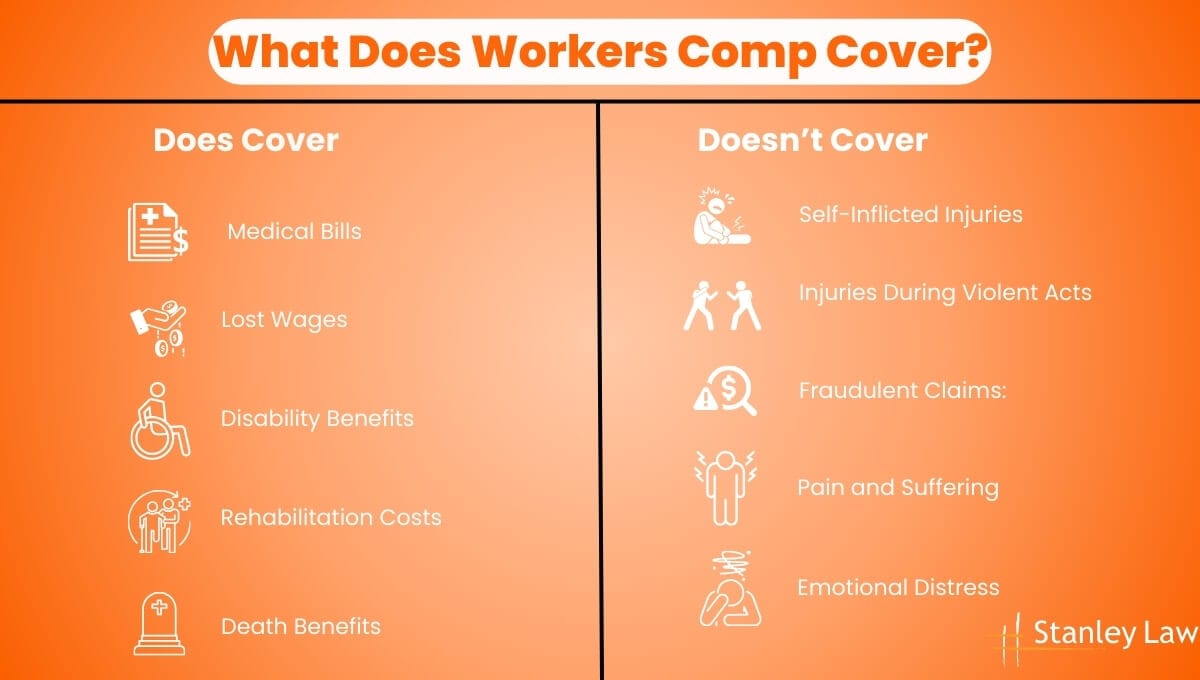Did you know that in 2021, 2.8 million nonfatal workplace injuries were reported across the U.S.? Understanding workers’ compensation is crucial if you wonder, “What does workers’ comp cover?” after an injury. This blog post will clarify key benefits workers’ comp provides, such as coverage for medical bills, lost wages, and disability payments, helping you manage your recovery process effectively.
For example, a New York school teacher injured her back while teaching. After some confusion, she claimed workers’ comp benefits that covered her medical expenses and part of her lost wages. Like her, knowing your benefits helps protect your rights under New York law.
Stay tuned as we explore workers’ compensation coverage specifics more thoroughly, ensuring you know precisely what to expect and how to claim your rightful benefits.
Understanding Workers’ Compensation Coverage
Workers’ compensation in New York provides essential medical care and wage support for employees injured or ill due to their work environment. This section will explore the fundamentals of workers’ comp, clarify eligibility criteria, and detail what these policies cover.
What is Workers’ Compensation?
Workers’ compensation is a protective system designed to support employees who suffer job-related injuries or illnesses financially. Since its establishment in 1914, New York’s workers’ compensation laws have ensured that affected employees receive necessary medical care and compensation for lost wages, protecting their well-being during recovery. Over the years, these laws have evolved to meet better the needs of modern workforces and changing job environments.
Who Are Eligible For Workers’ Compensation?
In New York, workers’ compensation covers a broad spectrum of employment types, each with specific conditions:
- Full-Time Employees
- Employers cover those working a standard workweek and receiving full benefits for job-related injuries and illnesses.
- Part-Time Employees
- Employees working fewer hours than full-time are also eligible for coverage, ensuring protection regardless of hours worked.
- Temporary Workers
- Workers hired for short-term employment also qualify for benefits for work-related injuries.
- Seasonal Workers
- Employees hired for specific seasons or peak times are eligible for workers’ comp during their employment period.
Exclusions: Not everyone falls under the umbrella of workers’ compensation. So, who can be excluded in the workers’ comp claim? Find below:
- Independent Contractors: These professionals are self-employed and do not qualify as company employees under workers’ comp laws.
- Certain Volunteers: Many volunteer positions do not provide workers’ comp coverage due to the unpaid nature of these roles.
If your employer has workers’ comp insurance, you can file a workers’ compensation claim if injured or ill due to your job, provided you meet the eligibility criteria.
Now that we know who is eligible for workers’ compensation let’s examine the specific benefits, such as medical expense coverage and lost wage compensation.
Core Benefits of Workers’ Compensation
Workers’ compensation offers vital support for employees with job-related injuries or illnesses. These benefits are pivotal in facilitating recovery and maintaining financial stability during challenging times. Below, we explore the workers’ comp benefits that help employees access necessary rights and assistance.

Medical Bills Coverage
Workers’ compensation reduces the financial burden of medical expenses incurred due to workplace injuries or diseases. This comprehensive coverage includes:
Types of Medical Costs Covered:
Doctor visits, hospital stays, surgeries, medications, physical therapy, and necessary medical equipment.
Examples of Eligible Medical Treatments:
Treatments may include emergency care, follow-up appointments, diagnostic tests (like X-rays or MRIs), and various rehabilitative therapies.
Compensation for Lost Wages
Workers’ compensation provides essential wage loss benefits for employees who cannot work due to injuries.
- Temporary Total Disability (TTD): This benefit is for employees who cannot work temporarily and is typically calculated as a percentage of their average weekly earnings.
- Duration of Wage Benefits: Benefits continue for the employee’s temporary disability until they can either return to work or achieve maximum medical improvement.
Disability Benefits
The nature and extent of an employee’s disability dictate the benefits they receive, designed to accommodate both temporary and permanent conditions.
- Temporary vs. Permanent Disabilities: Benefits vary depending on whether the disability is temporary (limited duration) or permanent (affecting long-term earning capacity, either partially or totally).
- Disability Ratings: The severity of a disability influences compensation levels, with higher ratings leading to increased benefits.
- Lump-Sum Payments vs. Ongoing Benefits: Employees may opt for a one-time lump-sum payment or ongoing benefits depending on their individual needs and circumstances.
Rehabilitation Costs
Beyond immediate medical and wage benefits, workers’ compensation covers rehabilitation services to aid employees’ return to the workforce.
- Vocational Rehabilitation Services: These services include job training and counseling to help employees return to the workforce.
- Retraining and Skill Enhancement: For those unable to resume previous roles, support is available to develop new skills or train for alternative occupations.
Death Benefits
In the unfortunate event of a worker’s death due to job-related causes, workers’ compensation provides vital financial support to the bereaved family.
- Death Benefits for Families: Dependents receive benefits to help sustain living expenses.
- Funeral Expenses: The program also contributes towards funeral costs, lessening the financial strain during loss.
After reviewing workers’ compensation benefits, knowing their exclusions is important. The next section will outline what injuries and situations aren’t covered.
What Workers’ Comp Does Not Cover
While workers’ compensation is a critical resource for injured employees, it’s important to recognize its limitations. Understanding what is not covered by workers’ comp is essential for managing expectations and preparing for potential challenges. Here’s a breakdown of exclusions within workers’ comp coverage:
Injuries Not Covered
Certain injuries or circumstances fall outside the scope of workers’ compensation, including:
- Self-Inflicted Injuries: Injuries that an employee intentionally causes themselves are not eligible for workers’ comp benefits.
- Injuries from Intoxication: Claims related to injuries sustained while the employee is under the influence of drugs or alcohol are typically denied.
- Injuries During Violent Acts: Injuries incurred during fights, criminal activities, or other violent acts generally do not qualify for compensation.
Situations Where Claims May be Denied
Workers’ comp claims can be denied for several reasons, affecting the employee’s ability to receive benefits:
- Pre-Existing Conditions: If an injury is related to a pre-existing condition, benefits may be denied unless the work environment causes the condition.
- Fraudulent Claims: Claims that involve fraudulent activities, such as exaggerating the extent of injuries, will be rejected.
- Delayed Reporting: Failing to report an injury on time affects eligibility for benefits, as delays can jeopardize the investigation and documentation of the claim.
Non-economic Damages
Workers’ compensation does not cover non-economic damages, which are typically associated with personal injury lawsuits:
- Pain and Suffering: There is no compensation under workers’ comp for physical pain or emotional distress resulting from an injury.
- Loss of Enjoyment of Life: Damages for the inability to engage in normal life activities are not covered.
- Emotional Distress: Workers’ comp does not provide benefits for mental anguish or emotional disturbances linked to workplace injuries.
Now that you know the exclusions of workers’ compensation, the next section will guide you on filing a claim in New York, making the process easier and helping you prepare.
Filing a Workers’ Comp Claim in New York
Filing a workers’ compensation claim in New York can be straightforward if you know the required steps. However, potential challenges may arise that could delay or complicate your claim. This section provides a clear path for filing your claim and addresses common issues you might encounter.
Steps to Filing a Claim
To ensure a smooth claim process, follow these essential steps:
- Report the Injury: It’s necessary to notify your employer about the injury as soon as possible, ideally within 30 days, to avoid any complications with claim validity.
- Seek Medical Treatment: Get medical care promptly and inform your doctor that the injury is work-related.
- File a Claim: Complete and submit Form C-3 to the New York Workers’ Compensation Board to start your claim process officially.
- Employer’s Report: Following your report, your employer must file Form C-2 with the Board and their insurance provider.
- Attend Medical Examinations: Attend any independent medical evaluations as required to verify the extent and nature of your injuries.

Common Challenges During the Claims Process
Be aware of potential obstacles that might impact the timeline or success of your claim:
- Delayed Employer Reporting: Sometimes, employers may not promptly file the necessary reports, which can slow down the process.
- Claim Denials: Insurers may deny claims if they question whether the injury was related to work activities.
- Pre-Existing Conditions: Insurers might assert that your injury is due to a pre-existing condition, not your job, which can complicate or halt your claim.
- Paperwork Issues: Ensure you fill and submit all forms correctly and on time; errors or omissions can lead to significant delays.
- Medical Disputes: Differing medical opinions between your doctor and the insurer’s doctor can delay the approval of your claim.
You know how to file a claim and what problems you might face. Now, let’s discuss how legal assistance can help maximize your claim.
How Legal Assistance Can Help Maximize Your Claim
Managing a workers’ comp claim can be complex and challenging. Engaging with a New York workers’ comp attorney can significantly improve your claim’s outcome by ensuring you receive the full compensation you deserve. Here’s how legal professionals can be instrumental in managing your claim:
Benefits of Working With a Workers’ Comp Attorney
Working with an attorney brings several key advantages to the process of filing and settling a workers’ comp claim:
- Gather Evidence: Attorneys are adept at collecting and organizing medical records, witness statements, and other crucial documentation to support your claim.
- Negotiation with Insurers: They expertly handle communications with insurers, ensuring fair workers’ compensation settlements and avoiding tactics that might reduce your benefits.
- Filing Paperwork Correctly: An attorney ensures all forms are completed accurately and submitted on time, reducing the risk of delays or denials.
- Appealing Denied Claims: In case of claim denials, attorneys will guide you through the workers comp process and represent you in hearings.
A New York workers’ compensation claim attorney can help you get more from your claim. It’s important to know when to get a lawyer. The following section will explain why you should hire a lawyer from Stanley Law Office and how they can help you.
Why Choose Stanley Law as Your Worker Comp Lawyers?
Choosing the right legal representation can significantly impact the outcome of your workers’ compensation claim. Stanley Law Offices has seasoned advocates with deep knowledge of New York’s workers’ comp system. Here’s how our experience and dedication can benefit you:
Key Advantages of Partnering with Stanley Law:
- Extensive Experience: Our attorneys bring decades of focused experience in workers’ compensation law, offering expert guidance and strong representation.
- Proven Track Record: We have a history of securing favorable client outcomes, even in challenging cases involving initial claim denials. Each successful appeal and settlement demonstrates our commitment to clients.
- Client-Focused Approach: At Stanley Law, we prioritize your needs and recovery. We offer personalized service, ensuring you are fully informed and supported from the start of your case to its resolution.
Choose Stanley Law for Results and Recovery:
When you engage Stanley Law, you select a team dedicated to your well-being and successful recovery. We are committed to securing the benefits you rightfully deserve and helping you get back on your feet.
Act Now for a Brighter Tomorrow:
Don’t wait—take the first step toward maximizing your workers’ compensation benefits. Contact Stanley Law today for a free consultation!

Conclusion
Under New York’s comprehensive workers’ compensation laws, you can receive crucial benefits for work-related injuries or illnesses. Understanding these rights is essential to ensure you receive the support necessary for a smooth and successful recovery.
If you’re unsure about your workers’ comp claim, remember you don’t have to face it alone. The Stanley Law Offices is equipped and ready to provide expert guidance and strong advocacy to help you secure the benefits you deserve.
Let Us Support Your Journey to Recovery:
Consider consulting Stanley Law Offices for a detailed case review. Our dedicated team is here to assist you every step of the way, from initial claim filing to securing a favorable outcome. Contact us today to protect your rights and make your recovery process as stress-free as possible.
What Steps Should I Take Immediately After a Workplace Injury To Ensure My Workers’ Comp Claim is Processed Smoothly?
- Report the Injury: Notify your employer immediately, within 30 days of the incident.
- Seek Medical Attention: Obtain necessary medical treatment and inform the healthcare provider that the injury is work-related.
- Document Everything: Keep records of all medical visits, treatments, and discussions with your employer about the injury.
- File a Claim: Promptly submit Form C-3 to the New York Workers’ Compensation Board.
Who Pays for Workers’ Compensation?
Employers pay for workers’ compensation through insurance premiums. All businesses must carry this insurance to cover medical expenses and lost wages for injured employees.
Are There Specific Mental Health Benefits Available Under Workers’ Comp in New York?
Yes! Workers’ comp covers mental health conditions related to work injuries or traumatic events in New York, including benefits for therapy and counseling.
What are the Consequences of Not Reporting a Workplace Injury Within the Statutory Deadline?
Not reporting an injury within the required timeframe can result in a denied claim, complicate your case, and reduce your likelihood of receiving benefits.
How Can I Appeal a Workers’ Comp Decision in New York?
File a notice of appeal with the New York Workers’ Compensation Board within 30 days of the decision. Include any additional evidence to support your case. Consulting with a workers’ comp attorney can aid in this process.
What is Workers’ Comp Fraud?
Workers’ comp fraud occurs when an employee or an employer intentionally misrepresents facts to gain benefits or evade responsibilities. Employees may exaggerate injuries to receive compensation, while employers might misclassify employees or fail to provide necessary coverage to reduce costs.
When to Hire a Workers’ Comp Lawyer?
Consider hiring a workers’ comp lawyer if:
- Your claim is denied or delayed.
- There are disputes with your employer or insurance provider.
- You need clarification on your rights and benefits.
- Your case involves complex legal issues or severe injuries.
- You aim to maximize the benefits you receive.

